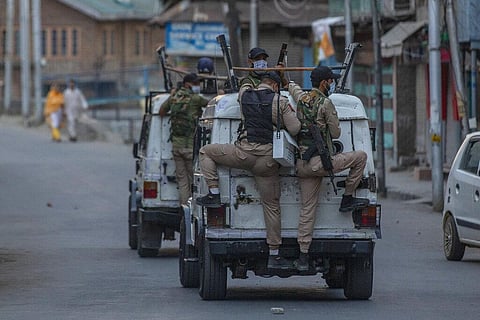

SRINAGAR: It will be a ‘hot winter’ in Jammu and Kashmir this year, with militancy related violence only set to escalate after the Taliban’s takeover of Afghanistan as ‘battle-hardened’ terrorists vie to sneak into the Valley.
According to senior security expert and former J&K Police chief Kuldip Khoda, the Taliban are not moving towards Kashmir as of now since they are dealing with ISKP.
“However, the fact is that fighters of the Lashkar-e-Taiba, Jaish-e-Mohammad and other terror groups supporting the Taliban in the fight against the US army have come back to Pakistan. The only obvious choice for them is Kashmir,” he said.
He said Pakistan’s strategy is to raise the pitch of militancy in Kashmir.
“Now that they are free from Afghanistan, their first task is to send a message that ‘outsiders’ will not be allowed to settle in Kashmir. That is why, there were targeted killings,” Khoda said, referring to the gunning down of five migrants in October.
On nine soldiers being killed during the army operation that has been going on in Poonch for three weeks, he said it “can be a morale booster for militants”.
Khoda said the security agencies should be worried because the militants who are infiltrating now had been in Afghanistan for a long time fighting the US troops.
“They are battle-hardened and better trained… There will be higher casualties on both sides as the operations against militants will increase,” Khoda said.
Asked whether he foresees a ‘hot winter’ this time, he said all indications are that the violence will go up. “Traditionally, violence level in winter is less because the mountain passes used for infiltration get closed due to snowfall. However, militants will try to focus on IB and LoC in Poonch and Rajouri.”
Another security analyst said the violence level may rise in Jammu if militants target IB and LoC to infiltrate. Some security analysts said pushing of battle hardened militants is an attempt to open a double front. “While these terrorists may launch attacks against security forces, the local militants may go after soft targets,” said an expert.
Meanwhile, the territorial ambitions of China and Pakistan require the Indian armed forces to remain alert and deployed along disputed borders and coastal areas round the year, Chief of Defence Staff (CDS) Bipin Rawat said on Sunday.
The CDS stated this while delivering the Sardar Patel Memorial Lecture at All India Radio.
"The quintessential visionary that Sardar Patel was, he had assertively voiced the need of an independent Tibet as a buffer state between India and China, as can be found in his correspondence with the then Prime Minister Pandit Jawaharlal Nehru," he said.
Rawat said history is witness to the fact that whenever a country neglects its armed forces, the external powers are quick to exploit it.
In the 1950s, India overlooked this important lesson of history and allowed the security apparatus to drift and the Chinese shook the country up in 1962, Rawat said.
"We had to relearn this lesson through an ignominious experience. Post-1962, we have had several skirmishes against the Chinese -- at Nathu La in Sikkim in 1967, at Wangdung in 1986, at Doklam in 2017 and the recent skirmishes in the eastern Ladakh," he noted.
The outcomes have made it clear that the Indian armed forces are alert and determined to defend national territory, he said.
This, he said, has helped the Chinese and our leaders to pursue agreements for maintaining peace and tranquility along the Line of Actual Control (LAC) and several other confidence-building measures to improve relations.
"Territorial ambitions of China and Pakistan require India's armed forces to remain alert and deployed along disputed borders and also along the coastal regions round the year," he asserted.
The current border standoff between the Indian and Chinese militaries erupted in May last year following a violent clash in the Pangong lake areas of eastern Ladakh and both sides gradually enhanced their deployment by rushing in tens of thousands of soldiers as well as heavy weaponry.
As a result of a series of military and diplomatic talks, India and China completed the disengagement process in the Gogra area in August and in the north and south banks of the Pangong lake in February.
Each side currently has around 50,000 to 60,000 troops along the LAC in the sensitive sector.
Rawat, in his speech, also recalled the role of the Indian armed forces in controlling the post-partition violence in India.
"No one had fathomed that the scale of mayhem due to the communal frenzy that was unleashed due to the partition of our nation.
"Large scale violence between people who once lived as one community resulted in the loss of thousands of innocent lives in 1947," he said.
The police force was limited in numbers, not fully trained or equipped, and was suffering from the trauma of communal fighting, he mentioned.
"The communal frenzy of that time was beyond the control of the police. The armed forces were then called in to control the furious rioting and enforce civil order," he added.
(With PTI Inputs)